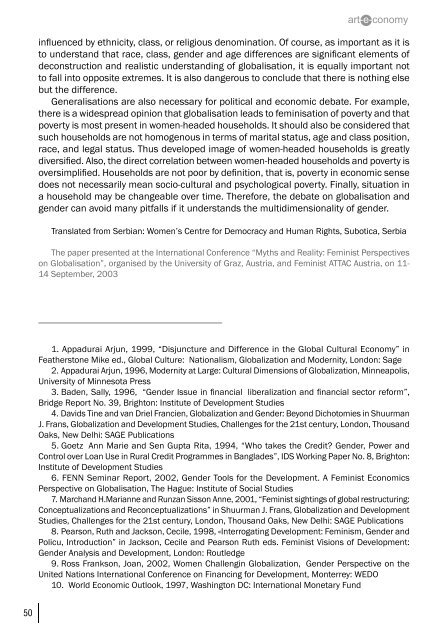art-e-conomy _ reader - marko stamenkovic
art-e-conomy _ reader - marko stamenkovic
art-e-conomy _ reader - marko stamenkovic
Create successful ePaper yourself
Turn your PDF publications into a flip-book with our unique Google optimized e-Paper software.
50<br />
influenced by ethnicity, class, or religious denomination. Of course, as important as it is<br />
to understand that race, class, gender and age differences are significant elements of<br />
deconstruction and realistic understanding of globalisation, it is equally important not<br />
to fall into opposite extremes. It is also dangerous to conclude that there is nothing else<br />
but the difference.<br />
Generalisations are also necessary for political and economic debate. For example,<br />
there is a widespread opinion that globalisation leads to feminisation of poverty and that<br />
poverty is most present in women-headed households. It should also be considered that<br />
such households are not homogenous in terms of marital status, age and class position,<br />
race, and legal status. Thus developed image of women-headed households is greatly<br />
diversified. Also, the direct correlation between women-headed households and poverty is<br />
oversimplified. Households are not poor by definition, that is, poverty in economic sense<br />
does not necessarily mean socio-cultural and psychological poverty. Finally, situation in<br />
a household may be changeable over time. Therefore, the debate on globalisation and<br />
gender can avoid many pitfalls if it understands the multidimensionality of gender.<br />
Translated from Serbian: Women’s Centre for Democracy and Human Rights, Subotica, Serbia<br />
The paper presented at the International Conference “Myths and Reality: Feminist Perspectives<br />
on Globalisation”, organised by the University of Graz, Austria, and Feminist ATTAC Austria, on 11-<br />
14 September, 2003<br />
1. Appadurai Arjun, 1999, “Disjuncture and Difference in the Global Cultural E<strong>conomy</strong>” in<br />
Featherstone Mike ed., Global Culture: Nationalism, Globalization and Modernity, London: Sage<br />
2. Appadurai Arjun, 1996, Modernity at Large: Cultural Dimensions of Globalization, Minneapolis,<br />
University of Minnesota Press<br />
3. Baden, Sally, 1996, “Gender Issue in financial liberalization and financial sector reform”,<br />
Bridge Report No. 39, Brighton: Institute of Development Studies<br />
4. Davids Tine and van Driel Francien, Globalization and Gender: Beyond Dichotomies in Shuurman<br />
J. Frans, Globalization and Development Studies, Challenges for the 21st century, London, Thousand<br />
Oaks, New Delhi: SAGE Publications<br />
5. Goetz Ann Marie and Sen Gupta Rita, 1994, “Who takes the Credit? Gender, Power and<br />
Control over Loan Use in Rural Credit Programmes in Banglades”, IDS Working Paper No. 8, Brighton:<br />
Institute of Development Studies<br />
6. FENN Seminar Report, 2002, Gender Tools for the Development. A Feminist Economics<br />
Perspective on Globalisation, The Hague: Institute of Social Studies<br />
7. Marchand H.Marianne and Runzan Sisson Anne, 2001, “Feminist sightings of global restructuring:<br />
Conceptualizations and Reconceptualizations” in Shuurman J. Frans, Globalization and Development<br />
Studies, Challenges for the 21st century, London, Thousand Oaks, New Delhi: SAGE Publications<br />
8. Pearson, Ruth and Jackson, Cecile, 1998, «Interrogating Development: Feminism, Gender and<br />
Policu, Introduction” in Jackson, Cecile and Pearson Ruth eds. Feminist Visions of Development:<br />
Gender Analysis and Development, London: Routledge<br />
9. Ross Frankson, Joan, 2002, Women Challengin Globalization, Gender Perspective on the<br />
United Nations International Conference on Financing for Development, Monterrey: WEDO<br />
10. World Economic Outlook, 1997, Washington DC: International Monetary Fund


